
By Arjay L. Balinbin, Senior Reporter
THE Air Carriers Association of the Philippines (ACAP) on Monday said about P700 million had been allocated for local airlines from the law that sets out the government’s recovery plan in response to the pandemic, on top of the P10 billion they expect from state financial institutions to lend to or invest in the industry.
The Bayanihan to Recover as One Act (Bayanihan II), which was signed by President Rodrigo R. Duterte on Sept. 11, has set aside P9.5 billion for the recovery programs of the Transportation department. Of that amount, P2.6 billion is dedicated to assist the critically hit businesses in the transportation industry.
About P7 billion is for the land-based transport workers and to build bicycle lanes, ACAP Executive Director and Vice-Chairman Roberto C.O. Lim told BusinessWorld in a phone message on Monday.
He added that air, land, and sea sectors are expected to get around P700 million each.
ACAP is composed of Philippine Airlines, Inc. (PAL), Cebu Air, Inc. (Cebu Pacific), Philippines AirAsia, Inc., Air Philippines Corp. (PAL Express), and Cebgo, Inc.
Each airline is expected to receive around P140-million loan assistance under the economic stimulus package, Mr. Lim noted.
He said further that government financial institutions (GFIs) are “supposed to get P30 billion equity infusion to give them funds to lend or invest.”
“If you divide that into land, air, and sea [sectors], the air sector may get loans/equity of around P10 billion or P2 billion if to be divided equally among the five carriers. GFIs hopefully will issue out the rules quickly. Note that a GFI loan evaluation process or investment due diligence process takes time — the entire process can easily take two months before an approval is obtained; so it is only December at the earliest that the transport sectors can see the money,” Mr. Lim explained.
He also noted the Bayanihan II mentioned grants on regulatory fees.
“If the rules of the Department of Transportation (DoTr) say it is a waiver of fees, that will be a good assistance. ACAP carriers pay around P500 million per month. A waiver as distinguished from deferral will help,” Mr. Lim added.
In a phone message to BusinessWorld, Civil Aviation Authority of the Philippines Chief of Staff Danjun G. Lucas said: “We will be coordinating this with the DoTr as well as with the other agencies under the air sector, especially the airport authorities, considering that this will affect their respective operations… We intend to meet with the other agencies within the week.”
The law directs the department to “provide direct cash or loan interest rate subsidy” and “grants for applicable regulatory fees.” The department is likewise directed to “allow substitution of refund option to travel vouchers, provide grants for fuel subsidy and/or digital fare vouchers, as may be necessary.”
Mr. Lim noted the ball is now with the executive branch to come out with rules quickly, so the intended beneficiaries can apply.
Airlines expect a 55% decline in 2020 air traffic, according to airline trade group International Air Transport Association (IATA).
IATA also said that while aviation faces a long-haul recovery, continued aid and assistance for the sector is desperately needed.
“With a recovery to 2019 levels now slipping to 2024, financial support, in forms which do not further load crippling debts onto the industry, will be necessary if an even sharper contraction in airline capacity and jobs is to be avoided,” it added.
